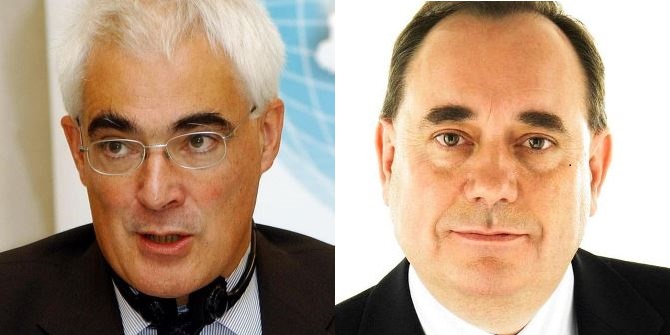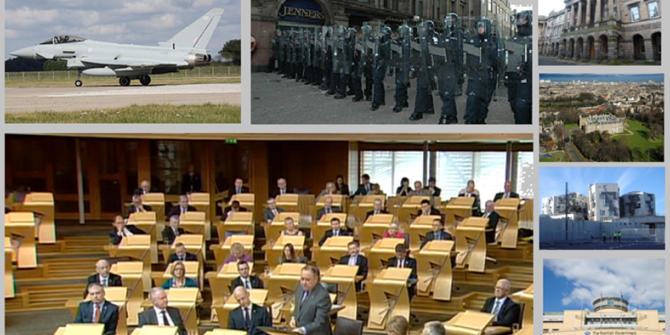 The new leader of Scottish Labour, Jim Murphy seems like the right person to help Labour recover its position in Scotland. However, he faces significant obstacles, not least that many voters see Scottish Labour as essntially a branch plant of UK Labour. Here, Eric Shaw summarises the challenges and points to some of the radical themes Murphy has been sounding in trying to turn the tide.
The new leader of Scottish Labour, Jim Murphy seems like the right person to help Labour recover its position in Scotland. However, he faces significant obstacles, not least that many voters see Scottish Labour as essntially a branch plant of UK Labour. Here, Eric Shaw summarises the challenges and points to some of the radical themes Murphy has been sounding in trying to turn the tide.
It seems trite to say that a new leader has inherited a crisis, but in Jim Murphy’s case it is true. It is also unexpected. Who would have imagined that in the wake of a closely but successfully fought referendum campaign, support for Scottish Labour would have plunged to levels (if the polls can be believed) not seen for almost a century. In 2016 Murphy will be fighting a tough campaign for control over the Scottish government but his immediate priority is to save as many of Labour’s 41 Scottish seats as he can. This is vital for the party’s Westminster prospects.
In many ways Murphy seems the right person for the job. The tall, affable and softly-spoken MP is a consummate television performer – a vital qualification these days for party leaders. He is also energetic, focused, astute and a skilled organiser and campaigner. As theorists of valence politics have argued for some time, the characteristics of party leaders are becoming increasingly important in voter judgments of the merits of rival parties. Awareness of this was probably the key factor in Murphy’s triumph, the politician best able to match the undoubted appeal of the new First Minister, Nicola Sturgeon.
But Murphy faces a formidable challenge. It has four key dimensions:
First, the shrinking core. It is customary to allude to Labour’s ‘core vote’ and its ‘heartlands’ but these concepts are of diminishing significance as a result of the well-known processes of partisan and class dealignment and general political disillusion. The shrinking core, in Scotland, has most obviously taken the form over the years of large numbers of people simply dropping out of the political system. The independence referendum reversed this in the most dramatic way as a large, dormant, politically detached swathe of the Scottish electorate was mobilized into activity. Many of these were young and working class – voters who would normally be expect to sympathize with Labour. But the evidence is that they are being hoovered up by the SNP. Labour absolutely has to reconnect with these groups but there are no signs so far that it has given much thought to this.
Second, the fragility of support. Evidence suggests that a considerable portion of Scottish voters oscillate between supporting Labour (normally in Westminster elections) and the SNP (for Holyrood elections). Switching between the two parties is facilitated by the fact that, the issue of independence aside, there is little, in terms of policy, programme and ideology, to distinguish between them. Research indicates that a decisive factor determining which of the two parties the undecided will opt for is their perceived capacity to stand up for ‘Scottish interests’. That the SNP was more positively rated was a key factor in its victory in 2011. Murphy fully recognises that he must convince the doubters that his party will be as robust a champion of Scotland as the Nationalists. The problem is how. The East Renfrewshire MP has been quick to stress Scottish Labour’s credentials as the party that will ‘stand and speak up for the Scottish people’. People must be persuaded that ‘supporting Labour is a patriotic choice’. The party he leads, he promised, will cease to be the representatives of UK Labour in Scotland and be transmuted into a very Scottish party. Will he get this message across?
Third, the UK dimension. It is unclear how much Scottish voters differentiate between Scottish and UK Labour when casting their ballots. It may well be that the loss of support for the Scottish party is to some significant degree a backwash of the problems assailing the national party, notably the poor perceptions of Miliband’s leadership and of Labour’s economic competence.
Fourth, the comparative dimension. It has occurred to astonishingly few that the plight of Scottish (and British) Labour is in any way connected with the wider social democratic predicament. Social democratic electorates are shrinking everywhere in the West, largely to the benefit of populist parties. Plainly there are some deep-seated processes at work here – social, economic, political, cultural – which raise profound issues, though this has scarcely impinged upon the collective mind of most politicians and commentators obsessed by the entrails of Scottish or British politics.
But Scotland is unusual in that Labour votes are not draining away to the radical right or left but to another broadly centre-left party. It seems that the SNP has successfully positioned itself as an anti-establishment party which enables it – like the more radical parties elsewhere – to tap into the widespread protest vote. Labour, Harold Wilson once said, ‘was a crusade or it was nothing.’ To New Labour this was dated thinking: it sought respectability, achieved it and the party is now paying the price – Labour as a party like all others. Murphy will only succeed to the extent that he can help the party regain some of that crusading zeal.
Can he? He has a number of assets – solid experience, political acumen and considerable interpersonal skills. In the eyes of his critics his deepest political instincts remain Blairite, but he is surely aware that whatever its past merits the New Labour message has lost resonance. Its key strategic precepts (the quest for ‘Middle England’) have proved to be counterproductive, for example by accelerating the alienation of the working class.
Equally Murphy is doubtless aware the strategic context in Scotland is radically different from that in England. The most formidable challenge confronting Labour is from the centre-left and any sign that Scottish Labour was regressing into a New Labour would be avidly pounced upon by the SNP.
Those who supported Neil Findley favour pushing the party to the left. This is unlikely to happen to any substantial degree though it is noticeable that Murphy has been sounding a number of radical themes such as a tax on bankers bonuses and a Mansion tax. He is, above all, a pragmatist.
Murphy’s most unexpected initiative so far has been his call for a new ‘Clause 4’ for Scottish Labour. What will this contain? He suggested five principles for what he rather grandly proclaimed as the ‘refounding’ of Scottish Labour. None of them are contentious, radical or innovative so it is hard to see – if they form the basis of the new clause 4 – a ringing declaration of party beliefs and purposes emerging. Scottish Labour has, for years, been cautiously reformist, solid, practical and rather unimaginative in outlook. It has many accomplishments to its credit not least in helping construct a broadly social democratic consensus in Scotland. But can Murphy refashion it into something more inspiring and exhilarating?
Note: This article was originally published on the PSA’s Insight blog and gives the views of the interviewee, and not the position of the British Politics and Policy blog, nor of the London School of Economics. Please read our comments policy before posting. Featured image credit: Anthony Mckeown CC BY-NC-ND
 Eric Shaw is Senior Lecturer in Politics at the University of Stirling.
Eric Shaw is Senior Lecturer in Politics at the University of Stirling.








I agree with much of your post but think you might be overplaying Murphy’s personal attributes. My impression is that he is widely seen as less trustworthy than even your average politician – not least in his recent linguistic contortions over “not being a Unionist”. Are voters convinced that Jim Murphy holds deep convictions and principles, or is just a slippery (if skilled) political operator?